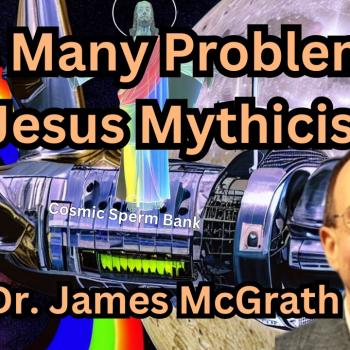The conversation started with demons.
Lots of people have had experiences such as sleep paralysis which are often then interpreted as some sort of sinister force attacking you in your sleep. One of the reasons for so many scandals and so many unhealthy attitudes among conservative Evangelicals is the tendency to treat natural urges and experiences as something coming from outside themselves. Repressing then and being dishonest about their source makes matters worse, not better.
But talking about shifting away from belief in demons, this recent conversation of mine then moved to what is left of Christianity if one starts jettisoning things like demons.
That is an excellent question, and quite possibly the most important one Christians today can and must ask.
There are two possible approaches for those who are honest. (For those who are not there is a third option of pretending to accept everything the Bible says while in practice being just as selective as everyone else.) One option is the classic liberal approach that viewed there as being a historical and moral core that remains once all the mythological elements of a first century worldview are stripped away like the shell of a nut. The other is Rudolf Bultmann’s approach of demythologization which admitted that the entire gospel is expressed in the language of first century myth and cosmology so that it is woven throughout its essence and not a mere husk that can be peeled away. The aim should be to understand the myth and find a way of interpreting its meaning, its challenge, for an audience in our time.
I have real sympathies with the latter approach. The idea that God is Triune is not something that one can justify from the teaching of Jesus or historical data. But the idea that interpersonal love is inherent in the nature of God is a powerful image. The incarnation is not found in our earliest Christian sources, but God not merely entrusting human representatives with “the ministry of reconciliation” but drawing closer to us rather than merely expecting humans alone to move is a powerful expression of that message in story form. I could give many more examples.
Yet in an era that has witnessed how the Christians most eager to preserve the mythological elements do not seem to care at all how badly they betray Jesus’ ethical teaching, the classic liberal approach seems more attractive than usual. A question that was posed in the conversation that inspired this post is whether, if we keep setting aside demons and miracles and the like, will we not soon be left with little else besides the Golden Rule and the call to love God and love our neighbor as ourself?
My response is normally to emphasize how much more we can say by finding new symbols and new stories to express our hopes and convictions about the transcendent.
In the present context, however, my response is to ask whether, if we are left with just the greatest commandments and the Golden Rule, that would really be so bad. These are the very things that so-called conservative Christians are casting aside while claiming they alone are faithful Christians because they affirm the virginal conception of Jesus and the penal substitutionary theory of the atonement. They affirm the shell while not merely casting aside the nut, the core, but tossing it on the floor and squashing it beneath their feet before throwing it in the trash like so much garbage.
In an era in which people who completely reverse the key ethical principles that are woven throughout Jesus’ teaching can call themselves “conservative Christians” and not believe it themselves and be believed by others, a reaffirmation of the classic liberal option is long overdue. Jesus never said “believe in the virginal conception and you will be saved.” He never said “accept this theory of the atonement and your sins will be forgiven.” He challenged everyone to take up their cross and follow, and to the wealthy like Americans as well as many others he emphasized the need to give up all we possess. That demand is one that exposes those who claim to be “Bible-believing Christians” for the liars they are. It shows the limits to their alleged literalism. It shows the profound selfishness and denial of Jesus that is expressed in refusing to wear a mask and demanding the freedom to stockpile weapons with which to kill other human beings.
In our era in which the name Christian has become associated more with belief in myths and political allegiance, it is more than appropriate if it t is reduced to Jesus’ central challenge, his core ethical principles.
Indeed, setting aside everything else but those key teachings might be the only thing that can save Christianity today, or rather, save its reputation…













